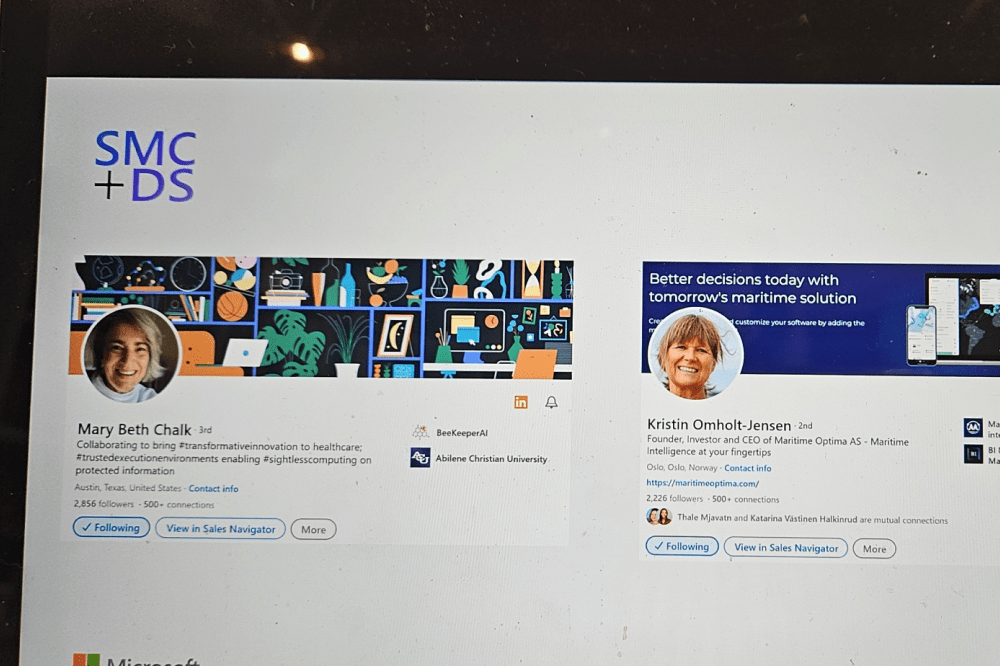
Digitalisation & Innovation? OK, but can we continue working as we have done please?
Search for "Maritime digitalization," and you will get a very long list of search results. If you interview companies and people working in the offices, you get a slightly different view. We have not changed much in how we organize ourselves and the way we work, on the shipping industry's commercial side during the last 20 years. Especially if we compare our industry with changes implemented in other global competitive industries.
All parts of the shipping industries are trained to look for opportunities. However, when we discuss digitalization, many people are afraid of the opportunities this new digital work environment will open up.
Digitalization will for sure also change our industry. However, digitalization is not all about data, software, and technology. It's also about people's knowledge, business models, how we organize, and what kind of risks we are comfortable taking on.
The algorithms need machine-readable data that our industry lacks, and we need to develop a structure for collecting and exchanging machine-readable data. I believe the winners will be those able to attract and retain people with domain knowledge working in cross-disciplinary teams. More than ever before, it is essential to mix people with solid domain knowledge with those having tech skills, and we should also start working in diversified teams and recruiting young people with tech skills and train them in shipping. It is crucial to understand the domain and why we have chosen to organize our industry the way we have when you start your journey into a digitalized world.
Here are some of the slides I shared with some students at The Norwegian School of Economics:
Which type of shipping are you in, and what will be the value-creating drivers in this segment?
I assume the readers already know the answer to this question 😊 . However, I recommend you ask many more questions; "What will be the drivers for change in this segment"? How will these drivers influence your business, your business model, your value chain, how you are working, and organizing yourself and the risk you are willing to take? Invite people outside your organization to tell about their experience from other industries. Invite people from your existing value chain, create diversified groups, and dare to involve people with different backgrounds than you have to start a meaningful strategy discussion.

Which of the four shipping markets attracts you?
Implementation of technology, new business models, and increased environmental focus and transparency will be essential drivers for change and will, for sure, influence how we divide "the markets."

Maybe the "four markets" will be more strongly tied together than today? Will we go back to integrated ship-owning entities, or do we still believe in simple business models for the stock exchange? Will cargo owners or countries be the only ship owners left? Will the entities grow bigger with no place for smaller entities and startups to enter? Will companies be involved in all four shipping markets? Who will be owning the steel?
Will brokers (all types of brokers) work the same way they have done? And will their business continue being a "no cure no pay" transaction-based business? Will the chartering and operation departments be one unit? What about the task we do today? Will the offices and the vessel be cost-effectively connected in real-time to exchange information and maximize decisions? You should start mapping the content of the jobs and processes that algorithms can easily replace and what will never be replaced by robots?
Be prepared because the traditionally "kings" in shipping will have a new "king" 🤴👸 in town; cargo is king, cash is king, talents are king, and now data is king,", so everyone should discuss the strategic ownership of their data. Is it OK to pay to access your own data related to a ship or should you own and selectively decide whom to share it with ? Which data is OK to make public and which data do you prefer to keep P&C ? In these days every company needs to establish a data owning and sharing strategy.
Many essential questions need answers! It is crucial to collect and store data in structures made for collecting and selectively exchanging machine-readable data. I think everyone should invest in data wrangling and abilities to successfully organizing cross-disciplinary and diversified teams 👍
What kind of risks do you "prefer" to take on?
Being a part of a value chain in "Bulk commodity shipping" has always been associated with high risk - high return or heavy losses. So we try to lower our risk exposure by organizing the risk through a chain of charter parties and legal contracts. We prefer "back-to-back" contracts and to do business with people we know. We also search to hedge our risk by entering into financial agreements like "bunker hedging" or bunker clauses, freight and exchange rate derivatives, etc.
Then we have the "CIF - FOB" discussions and whom to take what kind of risks, the traders, the market, and the value of the cargoes, and then sometimes cargo owners prefer to be ship owners as well and sometimes they don't.
Shipping might not be for everyone in town. However, shipping of commodities will continue to exist until we stop trading between countries and instead produce everything we need locally.
There are many different kinds of risks in shipping and in a more digitalized world, threats will not disappear. It might even be more volatile, so understanding what the drivers are behind the "risk" you take and establishing an alert system will be another essential part of success. So everyone needs to think about and "What kind of risks are you comfortable to carry"?
· Trade risk (move alongside the world economy)
· Supply& demand for vessels within a market segment
· Short term or long term?
· Steel or commodity?
· Political risk (embargoes, cabotage, tax& tolls, boycotts, green/environmental opportunities and new regulations like IMO 2020 etc.)
· Operating / technical performance risk ("optimize" OPEX or TCE or ROI by being a bareboat owner? )
· Type of financial risk (investor/equity- debt/banking - family, stock listing, private equity, venture etc )
· Environmental footprints
· Recruit and keep the right talents, organize the team efficiently so you can optimize the ROI (at least better than your competitors)
· And what will happen to your business model if some of your very talented people are leaving?
· What kind of software have you implemented?
· Image & brand on"SoMe" when "everyone" has a camera on the mobiles and can distribute "whatever they want" even though it is not true
· Are you a Manager, advisor or investor?
· "Innovation"; both hardware technology & software
· What kind of legal contract, insurance, and hedging instrument do you prefer?
· and many more questions.
The traditional way of organising "chartering and operation"
The chartering or freight departments' primary responsibilities are to optimize the TCE without taking on too much risk. Most companies organized their business like this:

The main tasks in the chartering departments are to collect information (read e-mails and talk to people), calculate and compare, analyzing the market, build "entry barriers (called relationships)," make quick decisions, negotiate. Making a career in a chartering department, you can't be too afraid of taking on risks.
If you look at the complexity and variety of the tasks done in a chartering department? Do you think "lonely cowboys", people preferring working alone, will be able to handle this in the future?
Do you believe it reduce or expand your risk if you organize your work in teams? Are you sure the tasks mentioned above will be the main tasks we will continue to do ? or do you think some of these tasks will be automized and "taken over by software and algorithms"?
Even though changes tend to take time, I think the digital wave we are already facing will force the organizations and the people to work and organize differently from the past.
Today and as we advance, it is of utmost importance to work agile and adjust quickly (which is a skill we are quite good at in the maritime industry 😉).

So why do people outside our industry says: "Maritime sector is known to be skeptical about new technology and slow to adopt and integrate"
Why is change so hard? Even though we operate in a very volatile market and make decisions every day under uncertainty and volatility, we seem to be resisting changes in the way we work.
Research papers and McKinsey reports claim the main reason for the lack of an innovative and agile culture and mindset is rigid routines and the lack of agile software implementation. I think this is so very true for the maritime industry. The software should assist agility, not force rigid routines almost impossible to change.
I think teamwork is the key to success. Teamwork tends to create an agile and competitive mindset. It attracts talents and the need for diversity (not every team member can be attackers; we need various skill sets to be successful. In football, we need goalkeeper, defenders, and midfielders alongside the attackers to systematically win games.
-min.jpg)
Data - the new oil, gold or king - or problem 🤔
So, in the future, there might be a high probability that your company will be more like a data science company that monetizes by operating a portfolio of vessels?
Like any tool, data science and big data are not silver bullets (knowledge, critical thinking, negotiations, and execution are still and will be the essential keys and difficult for algorithms to do).
However, before you run off to become a data science company, you have to prepare yourself that most of your time, getting there will be spent on "data wrangling."
Business process automation may yield massive amounts of structured data and metadata; however, it can be very costly to "data wrangle" from several old software stored in silos not fitted for the correct machine learning and algorithms. You can't build dashboards and run algorithms on "garbage data." What happens if the algorithms train on incorrect datasets?
So be aware of:
· Advisors telling you that you have to create your own "digital platform" through APIs and continue using your old software.
· Continue paying for expensive software excluding people in the organization participating with their skills and working in teams
· Replacing salaries paid for skilled and experienced chartering managers by data scientists, software developers, and dev ops not understanding the maritime domain.
· Continue using your old software, forcing you and your organization to continue working as you have done in the past resisting agility and innovation.
To me, that sounds very risky! So maybe the most important thing you should start doing is organizing your company into teams and establishing a culture for agility, diversity, and innovation. You might be surprised because successful teams want to be winners 😉
Algorithms and machine learning will surely change this industry, but persons(experts) understanding the critical value drivers for your business model, with skills who can negotiate and build relationships are hard to replace with "algorithms" 🤔












